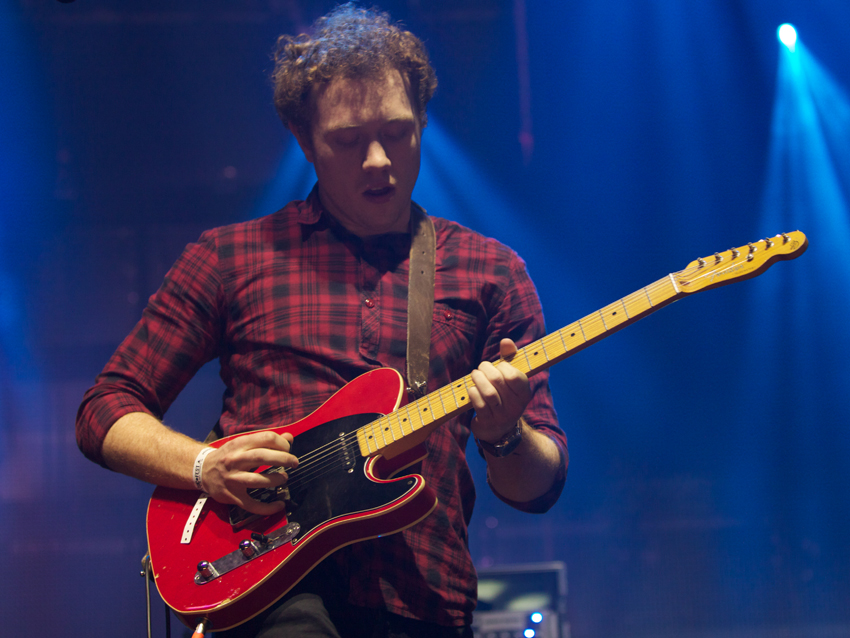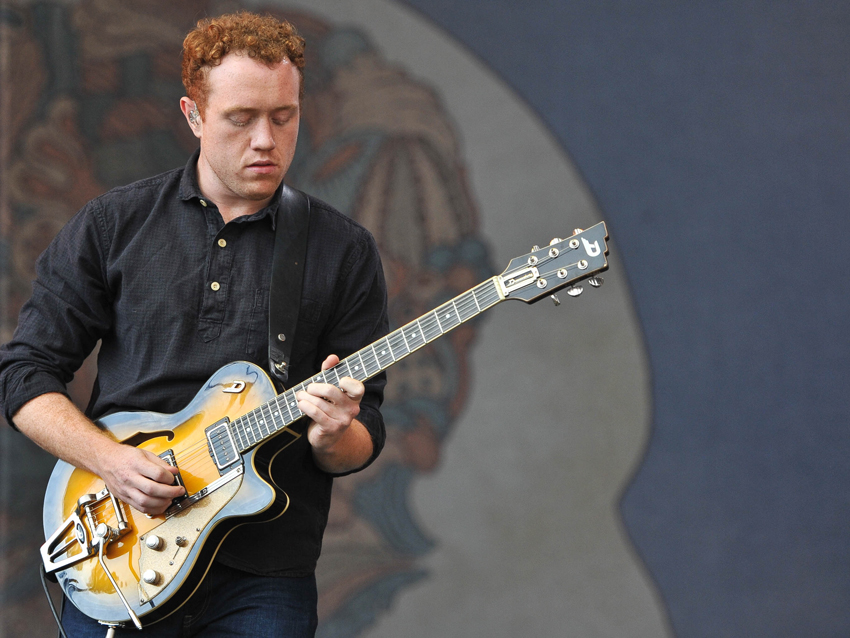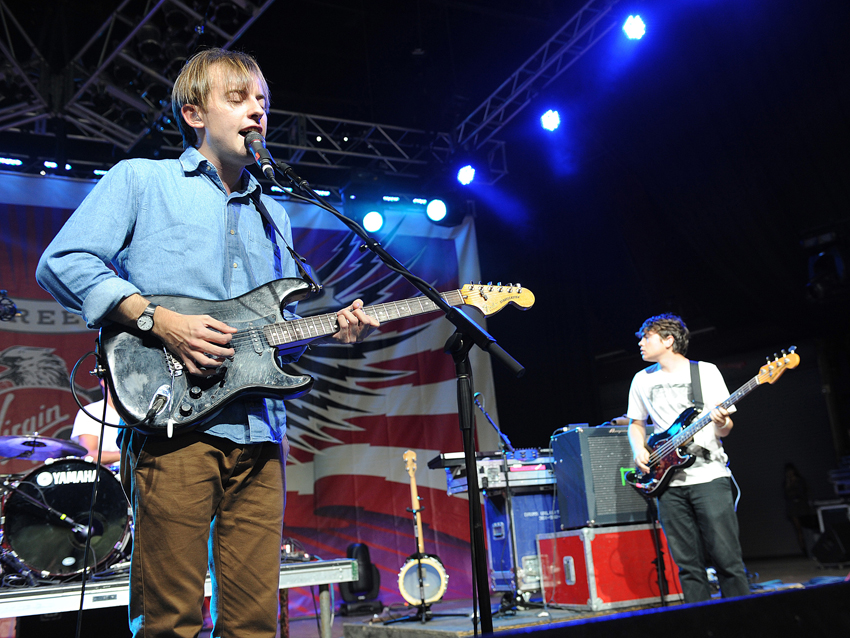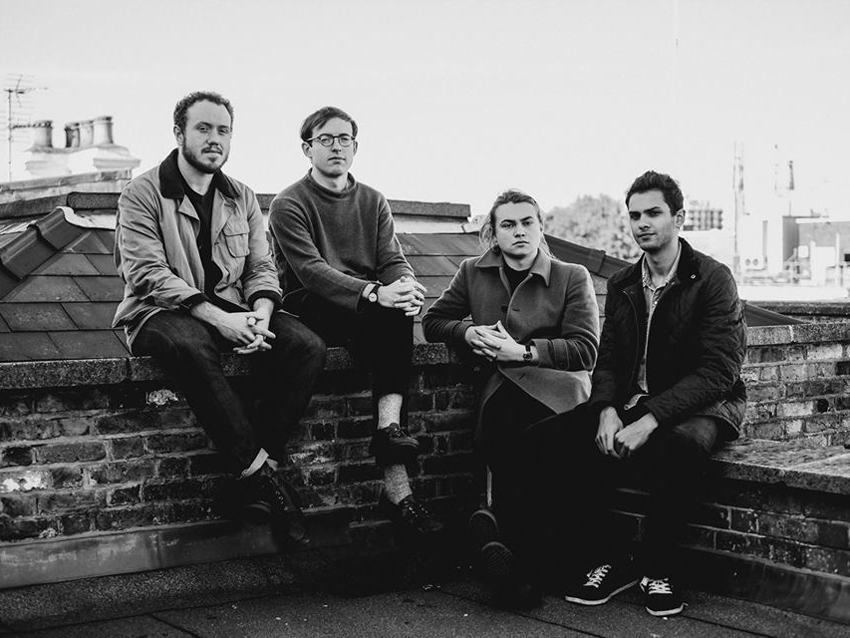Bombay Bicycle Club talk numbers ones, Afro beat and synth pedals
Jamie MacColl on topping the charts and being related to folk royalty

Bombay Bicycle Club talk numbers ones, Afro beat and synth pedals
Guitar music is something of a dirty word in the UK at the moment, but that hasn't stopped unassuming north Londoners Bombay Bicycle Club's steady rise.
Famously still at school when they were signed in 2006, the biggest band ever to be named after a chain of curry restaurants have taken a round about route to chart success. With three albums of, variously, fresh-faced indie fuzz, gentle folk and streamlined anthemia under their collective belt, BBC finally hit the jackpot in February, scoring their first UK number one album with So Long, See You Tomorrow.
MusicRadar caught up with guitarist Jamie MacColl to talk chart success, guitar skills and Afro beat...
How did it feel to top the album chart?
"We're still processing it, really. I don't think we're the kind of band that defines itself by those kind of moments. Hopefully we do it for other reasons.
"But at the same time, when I found out I obviously got incredibly excited: you can't help but get swept away by that kind of thing. And particularly for us, because it happened on our forth album, and we've kind of been working at this for quite a long time now. It's nice to feel like things get better every time as opposed to being in decline."
How has your playing style changed over the course of the last four albums?
"Well to be honest, when we first started the band I could barely play the guitar. We formed for a school assembly basically, and the teacher of our class picked the four people he thought were musical, and I somehow got lumped in with them [laughs]. But me and Jack, the singer, were really good friends and we bonded over a shared love of the same music.
"My guitar playing has really evolved over the course of the four records because they're all very different: the first album was a classic indie rock album I guess, so we looked to bands like Pavement, Sonic Youth, Yo La Tengo and Smashing Pumpkins for the chord progressions and guitar style that we were interested in.
"Then there was one song on that album, Always Like This, that kind of hinted at something else. It had quite a prominent afro-beat guitar riff. And that playing is something that we've eventually incorporated in our latest album. The lead parts are in a kind of afro-beat style, as opposed to looking at indie rock."

Afro Beat and folk royalty
How do you approach the afro-beat style on the guitar?
"I guess just play along with Fela Kuti records until you know how to do it [laughs]. Something like that! It's not just afro-beat, there's an element of funk too: we'd all been in funk bands before Bombay Bicycle Club, so we had a bit of that in our locker.
"For some reason between the ages of thirteen and fifteen at our school, funk music was cool. I don't know why but all the older, cool kids that we looked up to were in funk bands. It was the early to mid-2000s, and quite strange that [funk] should be in vogue!
"Then there's obviously the acoustic album [2010's Flaws]. Quite a lot of people attribute that to me because I come from a family of folk musicians, but until that album I hadn't really explored that way of playing. It was kind of more Jack that was leading the charge to make that album.
We're curious about your folk background [MacColl is the grandson of Ewan MacColl, while Pete Seeger is his great uncle]; were you exposed to much folk music growing up?
"I'd always been surrounded by folk musicians just by design of being the son and grandson of them, but it was something I just had to learn making the album really. I was learning finger picking and claw hammer, and so on.
"And funnily enough I learnt to do them with one of those instructional audio records on how to finger pick that had originally been released on vinyl. And it was actually Pete Seegar that was giving lessons, so it was a strange kind of full circle thing!"

Signature guitars and fret markers
You have a signature guitar out with Farida. What's the story behind that?
"They approached us about doing it. I think they'd done it with a few other people previously, and were interested in us. We faced a bit of a dilemma whether to make an acoustic or electric guitar, particularly because over the past couple of albums we've moved away from making acoustic music anyway.
"But at the same time, Jack and I both felt that we could make a better acoustic guitar than an electric one. We wanted to do it justice, and wanted to have something that we would want to play as opposed to something that maybe had our names on it, or was endorsed by us. You wouldn't wasn't to endorse something that you would't want to play."
So you had input into the design and feel of the guitar?
"Yeah, quite a lot. Obviously I couldn't make it myself, but I knew what I wanted and what I didn't like about a lot of acoustics. So that was the starting point.
"They made two, one for Jack and one for me. They're the same size and shape, but made from different wood. I think mine is a mahogany and rosewood, and his is a… maple, maybe? I can't remember what his is. But they're great sounding guitars.
"Jack decided to take all the fret dots off his, and unless you're quite a good player it's virtually impossible to play because you can't tell where you are on the guitar! So I think that was aimed at teaching people to become better players, but I've seen him make quite a few mistakes on it as a result [laughs]."

Electronics and synth pedals
There's always been an electronic element to the band, but it's come to the fore on the new record. How do you adapt to that as a guitarist?
"The initial difference is how the songs start. In the first two albums our chief songwriting tool was the guitar, whether they were electric or acoustic. And now, on the last album that's kind of changed. The songs might start with a sample or a drum beat that sparks an idea. So as opposed to being the primary melodic tool, the guitars have become another layer among many.
"On the record the guitars as buried quite low in the mix compared to the last album. And it's only when you see the show live that you realise how many guitar parts there are. So with this record it kind of took on a new life when we started touring it, because we realised that, to an extent, it had to conform more to who we are as a band. Which is, in essence, a four-piece guitar band with two guitars, a bass and drums."
What effects were you using for this record?
"This has been the big thing with my guitar playing for this record. A lot of the time in the studio we were trying to make guitars not sound like guitars. So yeah, there's a couple of synth pedals we used.
"I think there's a company called EarthQuaker Devices who have a pedal called the Bit Commander. I use that quite a lot. It makes the guitar sound like a synth basically!
"The Eventide PitchFactor got used quite a lot too, which does what it says, it changes pitch and adds harmonies. It's quite an interesting pedal but quite hard to use right. It was Ben Allen [producer] on the last album who introduced me to that, and we ended up stealing his ideas when we produced this one ourselves [laughs]."
For more information on visit the official Bombay Bicycle Club website, or connect with the band on Twitter and Facebook.